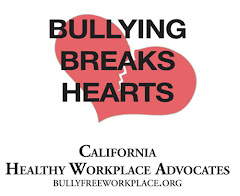Sunday, October 23, 2011
Saturday, October 22, 2011
Workplace Bullying vs Job Creation & Human Rights
Job creation may be based in creating a positive work environment so to attract talented employees who will contribute eagerly to a company’s profit making process. If this is the case, would anyone wish to work in an environment where their competence was being reacted to as a threat? Would anyone wish to be subjected to repeated, health harming treatment that interferes with the companies legitimate business interests? Let’s get on the same page with this.
The Healthy Workplace Bill is intended to “correct and prevent” workplace bullying by compelling businesses to put policies and procedures in place that, when enforced, would hold that business harmless if the egregious behavior in the workplace continued. Most people will STOP the bullying behaviors when told to STOP by someone with higher authority. Those people who won’t STOP the bullying behaviors would become personally liable in a civil court if the person targeted used this law to support their allegations.
For those of you who have been fortunate enough NOT to have experienced workplace bullying, I say, lucky you! I hope your professional experience continues to remain bully free. However, just because it has not happened to you, please do NOT assume it is not going on around you. If we all lived and behaved by the Golden Rule, we would not need any laws at all.
Work shouldn't hurt anyone. How can anyone be productive at work if they are under siege by a bully. Where do you think those schoolyard bullies go when they grow up with no intervention. This is a non-partisan issue; this is a human issue. For all the states that have an active Healthy Workplace Bill in current legislation, I say, Support the Healthy Workplace Bill and you'll be supporting human rights.
Wednesday, October 19, 2011
Memo to Executives: Let the Bully Go, Boost the Bottom Line
http://www.workplacebullying.org/2011/10/19/sponsors/
To Stop Workplace Bullying — Sponsors Must Cut Bullies Loose
Memo to Executives: Let the Bully Go, Boost the Bottom Line
Bob is the proverbial bully (Bobette when a woman). He operates freely without risk of being punished or terminated. So, every week is Freedom Week for bullies. Since Bob is free 52 weeks a year, dear executive, please use this one week, Freedom from Workplace Bullies Week, to end your relationship with Bob that makes life miserable for everyone else except you and Bob. It will take courage, of course. Here’s why and how to do it.
On balance, several people have tried to tell you about Bob before. You didn’t believe them. They brought you news about Bob you couldn’t stand to hear. It hurt you to hear, but they were reporting the emotional abuse Bob foisted on them. You had several fired for daring bring this information to you. Others quit out of desperation. Bob convinced you that they all were faulty and he alone is competent.
If you ask anyone other than Bob about the talent lost to your organization, you will find that Bob has been lying to you. Good people were driven out or were demoralized and dehumanized, then left. All of this was kept from you by Bob. In his narcissistic world, only he mattered.
Truth is, Bob has been too expensive to keep. You’ve paid dearly to retain him — lawsuits settled, turnover and replacement of key players, and lots of lost productivity. Just ask your Risk Manager or legal counsel.
So, there is no rational reason to keep Bob any longer. You may worry about a lawsuit from him if you begin to suddenly hold him accountable. Worry less. Take advantage of the “employment at will” principle. He’s gone when you say he’s gone. Will he survive? Yes, he will land on his feet. With that instant stroke of moral courage, you will send a message to all others who work with you that you care more about them than you care about the single person whose lips have been firmly planted on your behind.
 And while you are motivated to change the work climate for the better, besides removing Bob, consider drawing a line in the sand, defining the boundaries of unacceptable conduct. With that commitment, you will have a behavioral standard to which all the future Bobs (and there will be many emerging in the future — think whack-a-mole) can be compared. When they fail to act in an acceptable manner, cut them before the losses mount.
And while you are motivated to change the work climate for the better, besides removing Bob, consider drawing a line in the sand, defining the boundaries of unacceptable conduct. With that commitment, you will have a behavioral standard to which all the future Bobs (and there will be many emerging in the future — think whack-a-mole) can be compared. When they fail to act in an acceptable manner, cut them before the losses mount.
Finally, in the future, long after Freedom Week ends, believe the employees who report to you that they have been subjected to abusive conduct. They are not the likely liars. Bullies are the liars. Grow a thicker skin and stop showing your neediness to the cruel people willing to exploit you as they subordinate others.
Good employers purge bullies; bad ones promote ‘em.
Tuesday, October 18, 2011
Freedom Week: The Time to Break Silence About Workplace Bullying
http://www.workplacebullying.org/2011/10/17/freedom-week/
Bullying at work is a dirty little secret. Though it occurs with epidemic frequency (experienced by 35% of all adult Americans), it is a silent epidemic because it is too rarely discussed. Why the silence?
- personal shame by targets (who would brag about being humiliated?)
- coworkers frozen by bullies into not helping their bullied colleagues
- executives covering up for bullies they sponsor/support
- bullying is the American style of managing
Over time, fear paralyzes us all. Overcoming the inertia of inaction is difficult. We know.
But the most successful personal change plans are the ones triggered by events that suggest karma is working — a sign from above, a coincidental omen. That event becomes the excuse, the rationale, for doing something out of the ordinary.
WBI’s Freedom from Workplace Bullies Week is the reason to change how you are dealing with your bullying situation.
- City and County executives can formally recognize Freedom Week by proclamation. At the start of Freedom Week 2011, over 30 municipalities have issued such proclamations. Visit the gallery of proclamations.
- Bullied individuals and their families can take stock of the extent of the psychological injuries sustained from bullying. It sneaks up on everyone. High blood pressure goes undetected until the family physician asks what is stressful in your life. Use Freedom Week as the excuse to schedule an appointment to have your blood checked and to look for the onset of stress-related diseases. Ignoring your personal health is not a good idea. Bullying can kill. Please give your health as high a priority as keeping the salary to keep a roof over your head. If you die, no salary will have been worth it. Family members: please give your bullied partner or spouse the support she or he requires. They can build up credits that can be repaid when the bullying situation ends. Read the book The Bully At Work.
- Managers and executives need to calculate the financial losses attributable to preventable bullying. Bullies are actually too expensive to retain. However, the truth is that you are too loyal to bullies who have conned you over the years. When you acknowledge that “Bob” is a jerk, you are admitting the problem. But when you consider Bob indispensable, regardless of costs to the organization or his effect on others, you are condemning everyone to a living hell. Balance the needs of the business (profit making or budget balancing) with the narcissistic needs of Bob. Do the math. Talk to your Risk Manager. Bob is a liability. Stay friends if you must, but cut Bob loose for the sake of many. Honor your fiduciary responsibility to the organization. Bob will live on (elsewhere). Read the book The Bully-Free Workplace.
- Insurers and attorneys should warn your employer clients to prevent and correct costly bullying for their own self-interest and cost savings. Whether or not the employer has employment practices liability insurance (EPLI), bullying is costly. Premiums rise when liability increases. Bullies pose increasingly costly risks. Attorneys: you have been writing in recent years how your clients need to squelch bullying even though no specific laws exist. Continue this advice. Use Freedom Week to bolster that message. Visit The Work Doctor website to assure clients that something can be done about bullying.
- State lawmakers should enact legislation to curb bullying in the workplace. The Healthy Workplace Legislative Campaign has been around since 2003. It exists to help sympathetic lawmakers of all political parties to address health-harming abusive conduct at work (no need to call it workplace bullying). The Healthy Workplace Bill (HWB) has been introduced in 21 states. In 2011, the HWB is alive in 11 states, including Massachusetts and New York. During Freedom Week, Wisconsin state Rep. Kelda Roys and Sen. Spencer Coggs are introducing the HWB in both legislative chambers.
Saturday, October 15, 2011
Freedom from Workplace Bullies Week 2011: October 16th to 22nd
http://newworkplace.wordpress.com/2011/10/16/freedom-from-workplace-bullies-week-2011-october-16-22/
“Freedom from Workplace Bullies Week,” an annual observance sponsored by the Workplace Bullying Institute, runs from October 16 through 22. It is an important opportunity for supporters of the workplace anti-bullying movement to educate the public and rally others to the cause.
In the U.S., this movement is reaching the point where workplace bullying is a recognized phenomenon. Although there always are new audiences who haven’t named or labeled this hurtful and destructive behavior, these days we’re having to explain ourselves a little less than before. Within wider circles, the term “workplace bullying” is used and understood. Our educational work is far from over — the need will endure — but we’re seeing progress in terms of public comprehension.
For today, I want to center our attention on action. Toward that end, I’m re-posting my article “Ten ways to stop workplace bullying,” from December 2010:
Ten ways to stop workplace bullying
When people talk to me about workplace bullying, they often ask, what can I do to help? The following list is hardly exhaustive, but it’s a starting place:
1. Don’t — Don’t be a workplace bully. It starts with each of us.
2. Stand up — Stand up for someone who is being bullied. Silence equals permission.
3. Support — Similarly, support friends, colleagues, and family members who are experiencing bullying at work. Validate their concerns and, where appropriate, guide them to coaching, counseling, and legal assistance. (For some resources, go here.)
4. Ask — Ask your employer to educate employees about workplace bullying and to include an anti-bullying policy in the employee handbook.
5. Post — If you read an article on workplace bullying, post a comment to it online, voicing your support for taking this problem seriously. Help to generate momentum for the anti-bullying movement.
6. Talk — Yes, just talk about it with others. Without making a pest of yourself to your friends, family, and associates, discuss bullying as part of the workplace experience for many employees.
7. Law reform — Support anti-bullying legislation. For readers in the U.S., get active in the grassroots campaign to enact the Healthy Workplace Bill in states around the nation (link here). (Full disclosure: I’m the author of the Healthy Workplace Bill, so I do have an interest in seeing it enacted!)
8. Unions — If you are a member of a union, lobby your union leaders to educate members about workplace bullying and to negotiate an abusive supervision clause in the collective bargaining agreement, as discussed here.
9. Faith — If you are a member of a church, synagogue, or mosque, encourage your congregational leaders and fellow members to include workplace bullying among their social action concerns.
10. Connect — We must connect workplace bullying to other forms of interpersonal abuse, such as school bullying, cyber bullying, and domestic abuse. There are many unfortunate similarities between them, and helping others to understand this will serve as a powerful consciousness raising mechanism.
Words of caution
Some of these actions carry personal risks. There is something very threatening about this topic to certain individuals and organizations. Furthermore, when someone is suffering due to workplace bullying, they may be in a difficult place psychologically. Thus, please consider:
1. Those who stand up for bullying targets may find themselves next on the firing line. This is a very real possibility.
2. A bad employer may consider you a troublemaker simply for asking that the organization oppose these behaviors.
3. Posting a comment online about workplace bullying may lead to some people to ridicule your concerns.
4. Providing homebrewed psychological counseling or legal advice is not only unwise, but also illegal if you are not licensed to provide such assistance.
Thursday, September 29, 2011
October 16-22 Proclaimed Freedom From Workplace Bullies in City of South Lake Tahoe, CA
PROCLAMATION OF THE CITY OF
South Lake Tahoe
DECLARING OCTOBER 16 – 22, 2011
“FREEDOM FROM WORKPLACE BULLIES WEEK”
WHEREAS, the City of South Lake Tahoe has an interest in promoting the social and economic well-being of its employees and citizens; and
WHEREAS, that well-being depends upon the existence of healthy and productive employees working in safe and abuse-free environments; and
WHEREAS, surveys and studies have documented the stress-related health consequences for individuals caused by exposure to abusive work environments; and
WHEREAS, abusive work environments can create costly consequences for employers, including reduced productivity, absenteeism, turnover, and employee health-related expenses; and
WHEREAS, protection from abusive work environments should apply to every worker, and not limited to legally protected class status based only on race, color, gender, national origin, age, or disability;
NOW, THEREFORE, the Mayor, Hal Cole, and Council of the City of South Lake Tahoe hereby proclaim October 16 – 22 “Freedom From Workplace Bullies Week”.
Wednesday, September 21, 2011
California Healthy Workplace Advocates Agenda for September 24, 2011
Mission - The mission of the California Healthy Workplace Advocates is to raise public awareness and to compel our State to correct and prevent abusive work environments through legislation.
Overview of meeting: Introductions – Updates on progress - Activities - Sharing – Closing
INTRODUCTIONS * UPDATES ON PROGRESS:
Successful Citizen Lobby Day on Thursday, Sept. 15, 2011
Attendees: Sarah, Michelle, Roberta, Kathy, Monica, Carrie, Janet, & Paula
Reports on experiences and follow ups to and from and to legislative assistants
Report on Labor Day Celebration at Land Park in Sacramento: Sarah and Roberta
Report on CELA Conference : Sarah and Roberta
ACTIVITIES:
Anyone who wishes to approach their Mayor to proclaim Oct. 16-22 Freedom from Workplace Bullying Week can provide the city a copy of the Proclamation being used in Texas, Oregon, and Connecticut
Plan to schedule another Citizen Lobby Day in January for follow-up on 2012 Healthy Workplace Resolution and Healthy Workplace Bill
Handouts:
FREEDOM FROM WORKPLACE BULLIES WEEK, Oct. 16 to 22nd
California Healthy Workplace Resolution 2011 and 2012
Proclamation for City – 2010 Zogby Survey/Research Results Flier
OPEN SHARING
CLOSING
NEXT MEETING: October 22, 2011 3pm – 6pm
www.bullyfreeworkplace.org - www.workplacebullying.org
Stop Workplace Bullying Before it Starts
http://www.workplacebullying.org/2011/09/21/stop-workplace-bullying-before-it-starts/
Jane Applegate President & CEO, The Applegate Group Inc.,
September 20,2011
Everyone has experienced a bad day at the office when people are yelling and screaming at each other in frustration. But, if one person is the target of constant verbal and emotional abuse, it can escalate into a troubling case of ‘workplace bullying.’
Many small business owners refuse to acknowledge workplace bullying, preferring to hope the antagonist will eventually stop picking on a targeted co-worker. But, if you do nothing, the situation usually worsens, creating serious health and emotional problems for the bullied worker—and financial stress for employers, according to experts in the field.
If business owners don’t deal with bullying at work, it could result in a violent act. According to the U.S. Department of Justice, about two million violent crimes occur at American workplaces every year.
“There’s a real bottom line reason for business owners to take this problem seriously,” said David Yamada, professor of law and director of the New Workplace Institute at Suffolk University Law School in Boston. “If you are working in close quarters and things are tense and combative, it’s likely to affect everyone’s morale.”
An expert on workplace issues, Yamada authored the ‘Healthy Workplace’ bill, which has been introduced by legislators in 21 states. Currently, 16 versions of the bill—which aims to protect bullied workers from abusers, extending legal protections currently not available to them—are under review in 11 states. Most people think federal employment and discrimination laws protect workers from bullying, but they don’t, according to Yamada.
Being bullied at work makes life miserable. Experts say bullied workers suffer from anxiety, hypertension, depression and other stress-related illnesses. A 2010 Zogby study revealed that about 35 percent of all adult Americans have been bullied and 15 percent of the population has witnessed workplace bullying. The survey was authored by Dr. Gary Namie, Ph.D., and his wife Ruth.
Considered experts on workplace bullying, they have written extensively on the topic and consult with companies dealing with bullying issues. Their newest book, The Bully-free Workplace: Stop Jerks, Weasels and Snakes from Killing Your Organization, provides readers with an in-depth look at the problem and several strategies for dealing with workplace bullying.
“Bullying runs rampant in small businesses,” said Namie. “The owner wants to avoid conflict and doesn’t know what to do. They prefer to tell the abuser and the target, ‘you guys work this out.’”
Namie said he became interested in workplace bullying issues after his wife, Ruth, who is a psychologist, was bullied at work. “Our research shows 66 percent of women who are bullied at work lose their jobs,” said Gary Namie. “Forty-one percent quit, and 25 percent are fired.”
People bullied at work feel trapped—similar to someone suffering from domestic violence. It’s often worse for a bullied worker who feels he or she has to take the abuse because they really need the job, especially during this lingering economic slump.
How do you know if you have a bully in your midst?
“Bullying is a hostile, repeated behavior meant to make people feel badly,” said Carolyn Fedigan, a Boston-area human resources consultant who helps clients deal with bullying problems.
“I’ve dealt with a CEO who would regularly say to his secretary, ‘What, are you stupid?’”
Fedigan said some bullies take a more subtle approach. “They leave people out of communication loops, they spread gossip or single people out for the silent treatment,” she said.
No matter how distasteful it is, business owners can’t turn their backs on the problem. “There is a real financial cost to companies that let this toxic behavior continue, “ said Fedigan. “Bullied people take sick leaves, go out on disability and lose productivity.”
She said many business owners tolerate a bully if the person is a great salesperson or clients love them. “Sometimes the boss is scared of the bully,” she said. “They worry about the cost of turnover, of recruiting and training a new person.”
Business owners have to put their foot down and say, ‘We don’t accept this kind of behavior.” She said it’s important to have a written policy prohibiting workplace bullying. It’s also important to encourage your employees to report any inappropriate or bad behavior. “You have to have the kind of environment where employees can tell the boss what’s happening to them.”
Companies often hire Fedigan to counsel bullies. She works one on one with them, delving into why they are acting inappropriately towards a colleague. “Often, they have no idea they are a bully,” she said. “They think it’s an okay way to behave.”
Consider drafting an anti-bullying policy for your business that defines the problem and then:
Provides a procedure to report incidents.
Includes a ‘no retaliation’ provision.
Encourages employees to report incidents.
Informs employees that violations may result in discipline.
Subscribe to:
Comments (Atom)




























